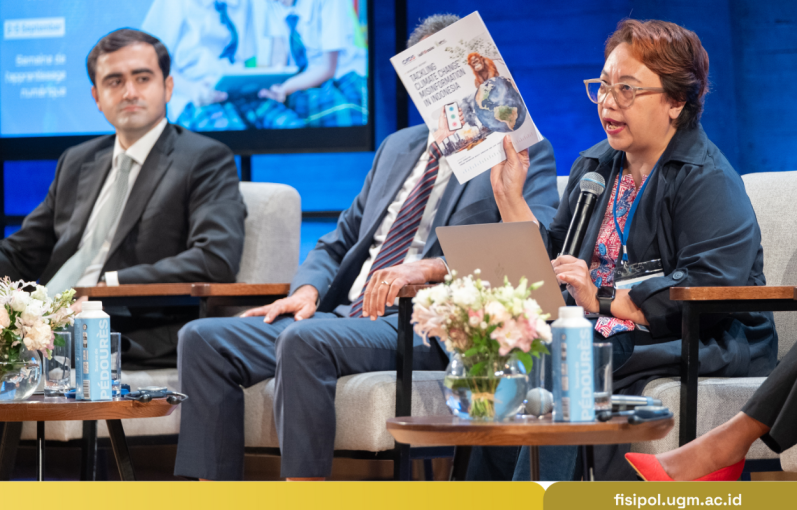
Yogyakarta, 17th of September 2024—Lecturer of Fisipol UGM’s Communication Science Department, Novi Kurnia, M.Si., M.A., Ph.D., became a speaker at UNESCO’s Digital Learning Week 2024: Steering Technology for Education. This event was organized in Paris from the 2nd of September until the 5th of September. In said event, Novi raised the issue regarding the misinformation and hoaxes about climate change.
The climate crisis has become a global issue that is faced by countries all over the world. Crop failure, droughts, rising temperatures, and other kinds of climate problems are caused by human activities that cause carbon emissions rapidly. The Indonesian Government has rolled out initiatives and policies in order to solve the climate crisis. Sadly, the people themselves are somewhat unaware of these crises. Not only that, now appears some opposition groups which believed the conspiracies regarding the cause of climate change.
“Research from Fisipol’s Center for Digital Society (CfDs) shows that 24.2% percent of respondents believe that the ongoing climate crisis is created by the global elite. These kinds of people are called climate change deniers, or people who refuse to believe that climate change exists” explained Novi. The lack of attention towards the climate change issue as well as the presence of opposition groups in the form of climate change denier can pose a threat to the government initiatives in handling the climate crisis. Therefore, strategies in combating climate crisis misinformation must be formulated as soon as possible.
According to research by the Center for Digital Society. 98% percent of misinformation comes through social media. Misinformation in social media can come in many forms, such as hoax contents, parodies, out-of-context clips, up to fake contents. Up to 57.7 percent of misinformation is found to be false connection regarding the climate crisis. Though most of the respondents can filter out fake climate misinformation, only 20 percent of respondents can surely fight back against all types of misinformation.
“As a country, Indonesia has a high amount of climate change deniers, because they are the ones who also spread misinformation. Precisely because the growth is not too fast, is all the reason why the government needs to fight back,” added Novi. The spread of information regarding the climate crisis is indeed not that popular with the people, research must also be done by analyzing verified information through the fact checkers. But, the possibility of the spread of misinformation regarding climate change will also increase if the public is aware of the issue.
Through a discussion panel themed “Pathways to Sustainable Futures: Navigating Digital and Greening Transition”, Novi also raised the issue of Artificial Intelligence as a way to fight back against the growing misinformation of the climate crisis. As of right now, anti-hoax organizations, such as the Masyarakat Anti Fitnah Indonesia (Mafindo), Aliansi Jurnalis Independen (AJI), as well as Google has used Artificial Intelligence as a tool for filtrating hoaxes and misinformations. Artificial Intelligence has the capability to filter and combat both articles or content flagged as hoaxes. Despite this, the use of Artificial Intelligence can prove to be a challenge.
“The fact-checking accuracy of Artificial Challenge is still about 30-90%. It is still hard for Artificial Intelligence to filter out context, and as such it is feared that the right information can be labeled as a hoax by the AI,” explained Novi. It is even harder for AI to filter out content in the Indonesian language, due to the fact that most if not all AI are programmed for contents in the English language. According to Novi, Indonesian and local based AI language models need further development and improvement. Other than that, the issue of ethics in regards to the freedom of expression proves to be a challenge in using AI for combating climate crisis misinformation.
The potential of AI as a tool to filtrate both misinformation and hoaxes needs to get special attention from both governments and non-governmental organizations. Collaboration from both sectors is desperately needed so that the issue of the climate crisis can be communicated to the people without the problems of hoaxes. Novi added that the development of AI needs to be based on the needs of the people themselves, with both local wisdom and values. If AI are not based on the people, it has the potential to spread both misinformation and hoaxes themselves.
The meeting of academia, governments, and NGOs alike in this UNESCO Meeting raised the global issues faced globally all across the world in implementing sustainable lives. As much as 300-400 stakeholders and experts from 50 countries in the world gathered in Paris in order to formulate strategies and commitments in fighting against the climate crisis.
